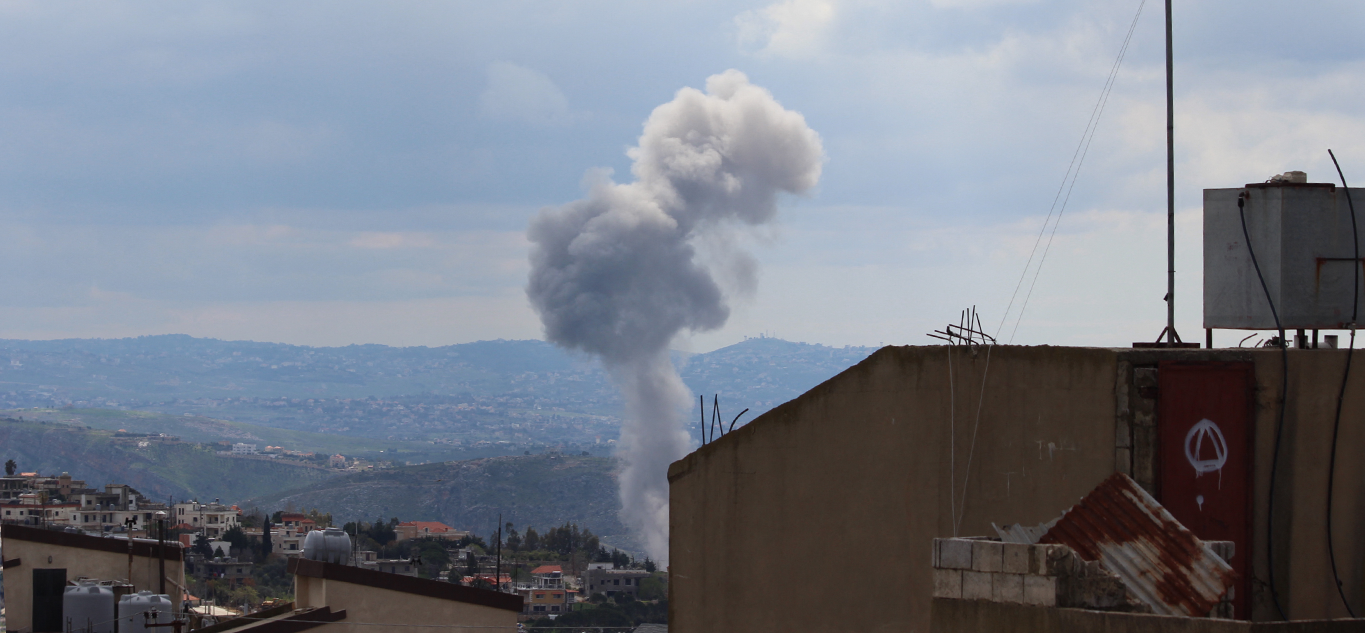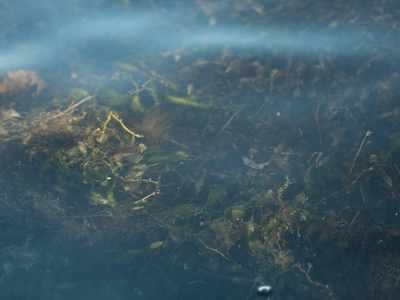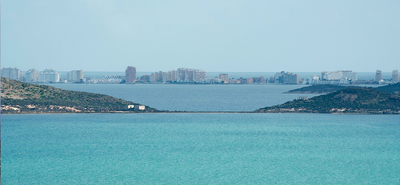- by Nourhanne Charaf Eddine
- This article by ARIJ is published here as part of the global journalism collaboration Covering Climate Now.
- Between November 3, 2023, and April 17, 2025 — based on information obtained through the Gherbal Initiative, a Lebanese civil society organization promoting freedom of information — Lebanon's Ministry of Foreign Affairs submitted eight complaints against Israel to the U.N. Security Council over the use of white phosphorus in southern Lebanon.
BEIRUT, Lebanon — Since the onset of the October 7, 2023 war, Israel has been bombing Lebanon with white phosphorus, damaging crops and causing serious health issues for civilians. The most recent bombing, (considering when this report was prepared), occurred on October 13, 2024, targeting UNIFIL forces, injuring 15 soldiers.
The use of white phosphorus violates international law due to its harmful effects on health and the environment. Despite this, Israel began using it in Lebanon between 10 and 16 October, 2023, according to Amnesty International.
The use of white phosphorus also violates Protocol III, of the Convention on Certain Conventional Weapons, which prohibits its use in populated areas. This gives Lebanon the legal grounds to pursue Israel in international courts. According to a study by Antoine Kallab and Leila Rossa Mouawad from the American University of Beirut, Israel has used white phosphorus in Lebanon multiple times, including in June 1982, July 1993, April 1996, July 2006 and October 2023.
The repeated and deliberate waves of bombing have destroyed hundreds of acres of agricultural land, severely affecting farmers' health. Hassan Saqqa, a 69-year-old farmer from the village of Al-Sultanieh in southern Lebanon, shared his suffering: “I work here to afford my medicine, but now my situation is difficult, and my treatment costs around $2,000 (circa 1,700 euros) per month.”
Saqqa’s suffering is part of a broader crisis. According to the society of Olive Harvesters of Lebanon, the 2024 season is the worst in decades. Climate change has caused significant crop losses and Israeli bombings using white phosphorus and depleted uranium have devastated olive groves in southern Lebanon. This has prevented farmers from harvesting their olives and poses a long-term threat to their health, with fears of cancer and genetic deformities being spread across the community.
White phosphorus is a waxy, yellowish or colorless substance with a garlic-like odor that ignites spontaneously at temperatures above 30 degrees Celsius (86 degrees Fahrenheit). Depleted uranium, used in bombs, has exceptional penetration power and its dust can cause serious health issues, particularly when inhaled, according to the Lebanese Chemists' Syndicate.
Threat to food security
White phosphorus affects all agricultural crops irrigated with water contaminated by its elements, and thus, this impact extends to humans through consumption.
Antoine Kallab, Associate Director of the Nature Conservation Center at the American University of Beirut, explains this by saying: “The spread of white phosphorus can affect multiple ecosystems and may threaten food security at the local level. It can also cause contamination of water streams, impacting the health of nearby communities that rely on these sources for drinking water. Additionally, nearby fish traps become at risk of contamination, which could transfer to humans through consumption.”
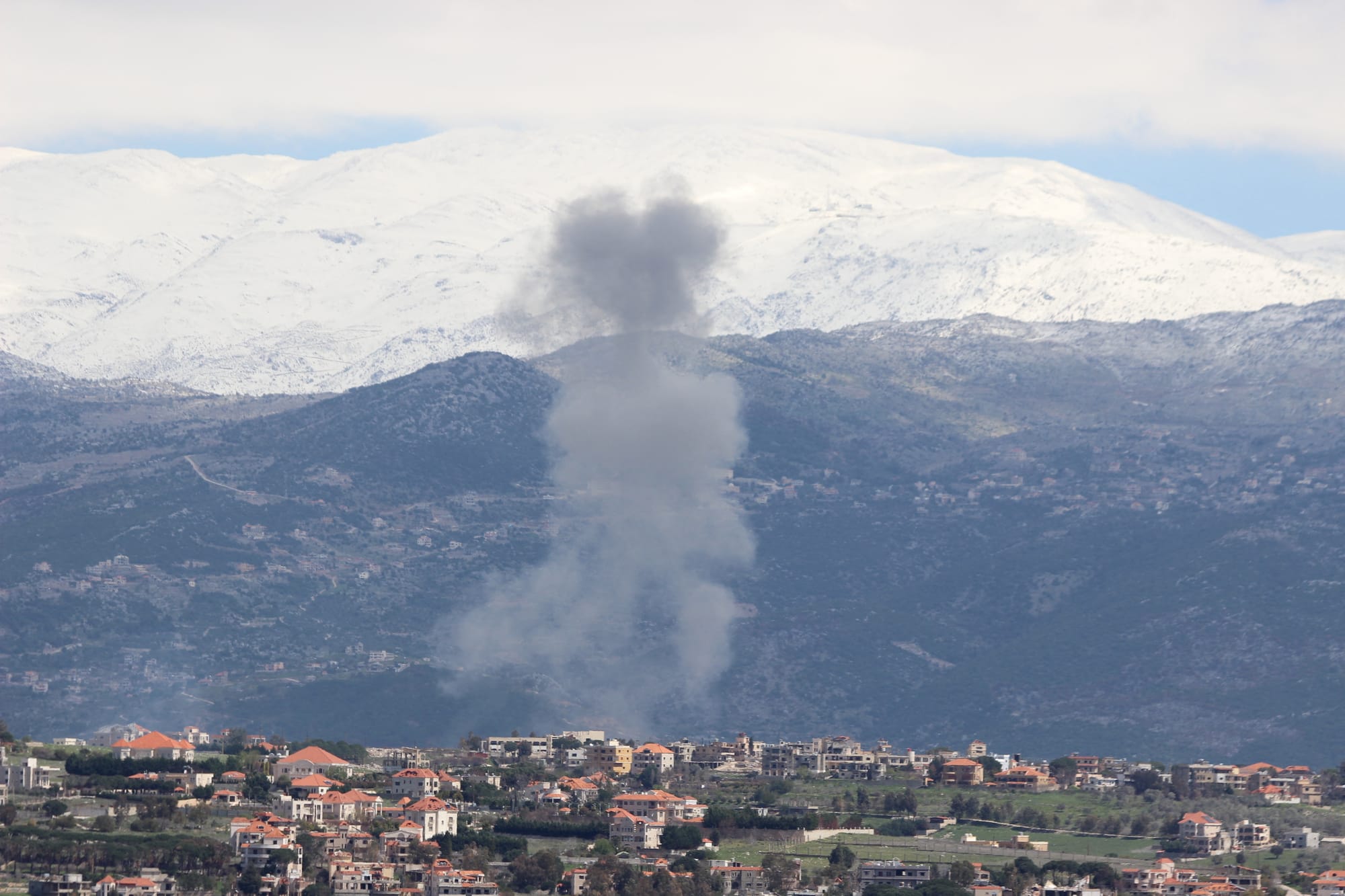
This was confirmed by the National Authority of the Litani River, as the Israeli targeting – which affected all Lebanon – also reached the Litani River. This impacted the river's color and the odor emanating from its course was toxic, according to information obtained by ARIJ from the authority through the Gherbal initiative.
The authority collected samples from four areas of the Litani River: Khardali, Sir al-Gharbiya-Tir Falesh, Zawtar al-Gharbiya-Qaqaiyat al-Jisr and Qasimiyah. The samples revealed that the concentration of lead exceeded the maximum permissible limit in the surface waters of the examined areas. The lowest lead level was found in the waters of the Sir al-Gharbiya-Tir Falesh area, approximately 0.122 milligrams per liter, which is 1,220 percent higher than the maximum allowable limit of 0.01 milligrams of lead per liter, according to the World Health Organization.
The organization adds that the effects of lead may cause “anemia, high blood pressure, kidney failure, poisoning of the immune system and reproductive organs, and severe lead poisoning may lead to coma, seizures and even death.”
In addition to lead, the results of the “samples” analysis indicated the concentration of cadmium, which “exceeded the maximum permissible limit in the surface waters in the Zawtar al-Gharbiya-Qaqaiyat al-Jisr area.” The cadmium concentration was approximately 0.032 milligrams per liter of river water in Zawtar al-Gharbiya-Qaqaiyat al-Jisr, while the maximum permissible concentration is 0.003 milligrams per liter of water.
Cadmium is a natural element found in small amounts in air, water, soil and food, according to the National Cancer Institute in the United States. The World Health Organization explains that it “negatively affects the kidneys, skeletal system and respiratory system, and is classified as a carcinogen to humans. Cadmium can travel long distances from the emission source through airborne transport.”
The organization further adds that there is “sufficient evidence of its role in causing lung cancer.”
The study also suggests the presence of lead and cadmium for several reasons, the most significant being dust, building walls, explosive materials resulting from rocket explosions, soil erosion carrying pollutants into the river and the leakage of heavy metals from pipes when they are damaged by missile strikes.
In addition to lead and cadmium, the report recorded a noticeable increase in the levels of phosphorus and phosphates, which were approximately 20 times higher than their average levels over the past five years.
The report added that the recently recorded levels of phosphorus and phosphates are abnormal, those are levels that the river had never recorded before the Israeli war on Lebanon, making the war the cause of phosphorus pollution.
Damage to agricultural activities
The repeated targeting with white phosphorus, in addition to the loss of thousands of acres of agricultural land, has placed Lebanese lands at risk of desertification.
Agricultural engineer Hanna Mikhael explains: “We lost oak and juniper trees, we lost olive trees, we lost many types of trees. We lost them and we cannot plant other plants in their place. We lost the land, the environment got polluted... I imagine all of these are signs of desertification.”
In this context, Lebanese Minister of Agriculture Dr. Abbas al-Hajj Hassan clarifies the extent of the damage to agricultural areas: “Six-thousand dunams (600 hectares) were indirectly or partially affected, and 2,500 dunams (250 hectares) were completely destroyed. Of course, this is a huge number... these forest areas were trees that provided us with significant economic returns.”
According to the Lebanese minister, “This Israeli approach exacerbates the issue of global warming, and it destroys all efforts aimed at helping the Middle East reduce the Earth's temperature, combat global warming and address desertification.”
Warning of desertification
Despite the massive destruction during the “July War” between Lebanon and Israel in 2006, the bombing only affected about 25 percent of the agricultural land, particularly in southern Lebanon. However, in the recent Israeli war (2023-2024), the targeted agricultural areas increased, further exacerbating the losses in this sector, according to farmers we spoke with while working on this report.
Farmer Hassan Saqqa explains the situation at the time: “The 2006 war lasted for a limited period, only 34 days, and olives are harvested in October. Most of the airstrikes (during the 2006 war) targeted properties.”
According to the Ministry of Agriculture's figures, the damage extended beyond just the land, affecting the entire agricultural and livestock sectors. Minister Abbas al-Hajj Hassan explains that the value of the southern region's production in the national output used to represent about 20 percent, but after the recent war, this percentage decreased.
With the expansion of the war on Lebanon on September 23, 2024, 68 percent of the agricultural areas were affected, either directly or indirectly, in the regions of Nabatieh, the South, Beqaa and Baalbek-Hermel. Meanwhile, only 32 percent of the cultivated areas in Mount Lebanon, Akkar and the North were spared.
The Israeli war resulted in the complete destruction of more than 3,220 dunams (322 hectares) and the damage of approximately 7,200 dunams (720 hectares) in the southern governorate, including agricultural and forested lands.
Lebanese Minister of Agriculture, Abbas al-Hajj Hassan, confirms that at least 45 percent of Lebanese people are directly or indirectly affected by the agricultural sector due to the rising prices of certain products.
According to the Lebanese Ministry of Agriculture, the number of fires caused by the use of white phosphorus reached 1,042 fires, from October 2023 to August 2024.
High costs
Agricultural engineer Hanna Mikhael confirms that while phosphorus bombing is prohibited under international law, its removal remains a difficult task: “Because white phosphorus is banned worldwide, there haven't been many studies on how to rehabilitate land after phosphorus bombing... There are some crops capable of cleaning the environment.” Additionally, there are bacteria that can be added to the soil to convert this substance into other materials that plants can absorb. These are generally the solutions, but the cost remains extremely high, according to Mikhael.
Antoine Kallab, Associate Director of the Nature Conservation Center at the American University of Beirut, also points to the high cost of phosphorus cleanup efforts, based on experiences from other countries. Kallab adds that the U.S. government allocated $400 million (over 340 million euros) for environmental rehabilitation from the effects of “Agent Orange”, using landfills to dispose of contaminated soil and sediments. The heavily contaminated soil is treated through thermal conduction heating, where the pollutants are heated at no less than 300 degrees Celsius (572 degrees Fahrenheit) to deactivate the toxic compounds.
He also mentions the “Eagle River Flats” site, as another example, where it was declared highly toxic after years of testing contaminated munitions by the U.S. military. Cleanup efforts continued at the site through pond pumping and sediment drying from 1982 to 2008.
"Lebanon's corruption" enhances a culture of impunity
The information obtained by ARIJ from the Nature Conservation Center highlights the increased impact of white phosphorus on civilians, from the first Israeli phosphorus bombing of Lebanon in 1993 to the latest waves of bombing from October 2023.
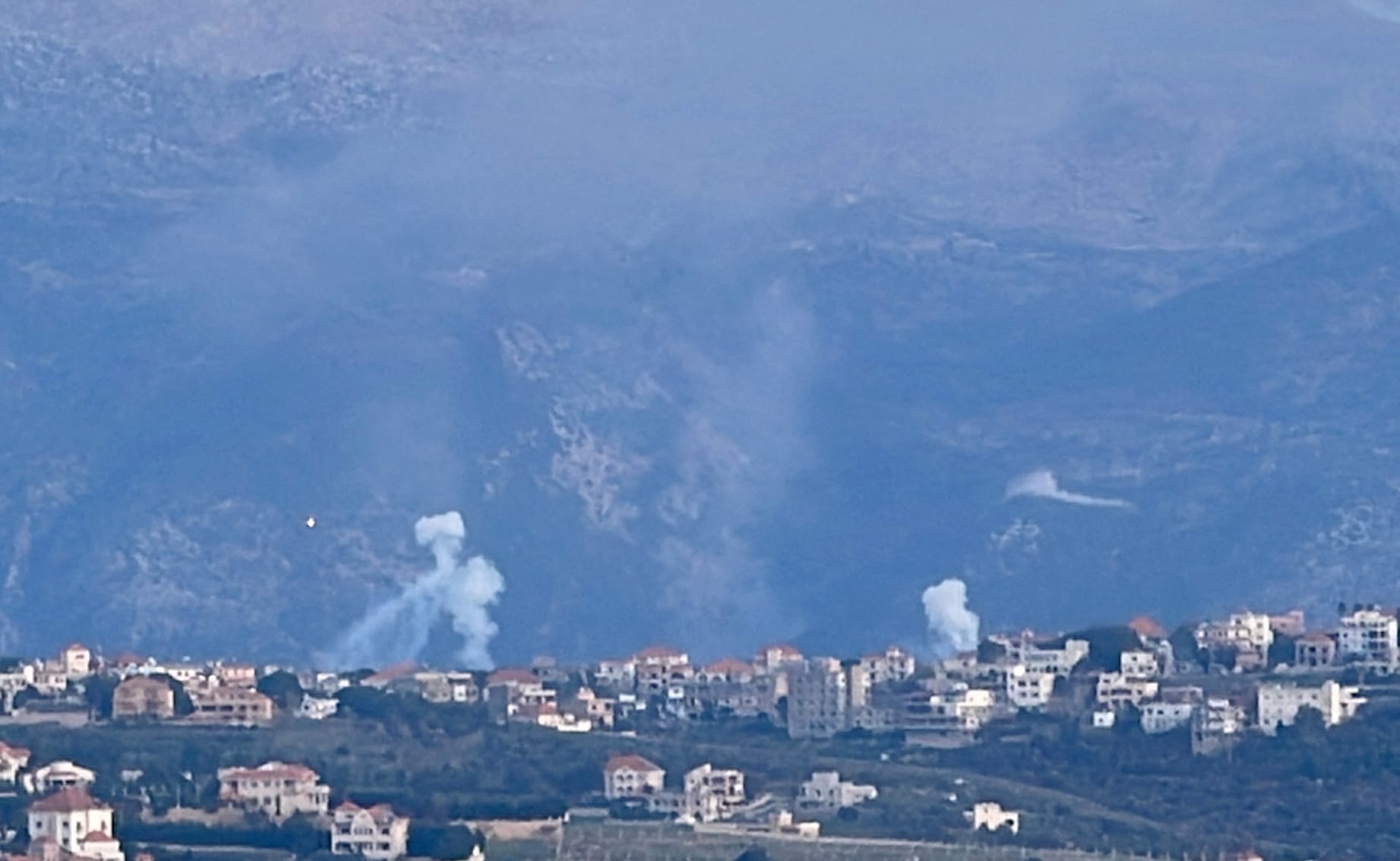
Lebanon has been subjected to Israeli phosphorus bombings multiple times, yet the Lebanese government has not filed any complaints before the International Criminal Court. Despite the fact that the Human Rights Committee, part of the parliamentary council, was preparing to file a complaint against Israel.
Legal expert Karim El Mufti, scholar in Political Science and International Law at Sciences Po in Paris, believes that Hezbollah was behind obstructing the lawsuit against Israel: “There was an attempt very early on, months ago. I prepared a draft with the Human Rights Committee of the Lebanese Parliament for a project intended for the Foreign Minister, at least to open the space to sign the declaration of Article 12, Paragraph 3, to seek compensation from Israel.”
El Mufti explains that investigations could have consequences for Hezbollah as well, not just for Israel, because the International Criminal Court does not focus on just one side, but considers all aspects, as in the case of Palestine, where arrest warrants have been issued for both Hamas leaders and Israeli officials.
He adds that Lebanon still has an opportunity to defend itself in international forums against Israel: “Lebanon also has another option that it has not agreed to use, which is either to join the International Criminal Court, as Palestine did, or simply to declare the court’s jurisdiction under Article 12, Paragraph 3 of the Rome Statute. This means you don’t join, don’t ratify, or sign the Rome Statute, but you grant the International Criminal Court jurisdiction for a specific timeframe.”
According to El Mufti, the United Nations had previously demanded that Israel pay Lebanon compensation of no less than $800 million (682 million euros), but the demand was not mandatory because Lebanon would need to go to the International Court of Justice and proceed in that direction, which Lebanon has not done out of fear of recognizing Israel. El Mufti questions why, when Lebanon signed the maritime border agreement, there was no issue with recognizing Israel and reaching a deal with it and even Hezbollah did not object to that.
High civilian toll from "phosphorus aggression"
According to figures from the Lebanese Ministry of Health, the number of casualties during the ongoing war from October 8, 2023, to August 20, 2024, reached 2,412 people, including 257 individuals who were injured by white phosphorus. This indicates that 10.66 percent of the injuries were caused by phosphorus.
Antoine Kallab, Associate Director of the Nature Conservation Center at the American University of Beirut, confirms that the chemical toxicity of white phosphorus is extremely dangerous. He explains that if its burns affect just 10 percent of the body, it can lead to the victim's death. Moreover, the white phosphorus flame cannot be extinguished with water, requiring immediate access to specialized care, which is often unavailable in conflict zones.
He adds: “People who inhale white phosphorus smoke often suffer from multiple complications, such as respiratory and digestive disorders, and bone deformities due to the high toxicity of the substance. Survivors are also at high risk of organ failure, including the heart, kidneys and liver.”
Tharwat El Zahran, an Associate Professor of Emergency Medicine at the American University of Beirut, explains the risks of skin exposure to white phosphorus: “Skin exposures can lead to extremely painful burns, varying in depth, with a yellowish color due to the chemical and thermal effects, accompanied by a smell similar to garlic. These burns can cause second- and third-degree injuries within minutes to hours.”
War and economic crises
In addition to the war, the economic crisis that Lebanon has been suffering from, since 2019, has worsened agricultural problems in the south, particularly after the decrease in municipal budgets, which led to a reduction in investment in local agricultural development.
This is confirmed by farmer Hassan Saqqa, who says: “Working with municipalities has become non-existent,” due to the decline in their budgets following the economic collapse, the COVID-19 pandemic, and the overall economic situation. He adds, “I used to work in several houses owned by expatriates, but they were afraid to waste their money in case the war broke out, so work decreased by 80 percent.”
In addition to the obstacles posed by bombing and war, Lebanese Minister of Agriculture Dr. Abbas al-Hajj Hassan confirms the Israeli targeting of farmers: “There are sniper operations, despite that farmers try to harvest their crops. However, they can only harvest about 30 percent of their crops.”
Al-Hajj Hassan adds, “The Israelis know well that they are farmers, but they don't want them to work on their land.”
In the top image, Israeli army strikes in southern Lebanon on March 22, 2025 (Ramiz Dallah/Anadolu via AFP).

